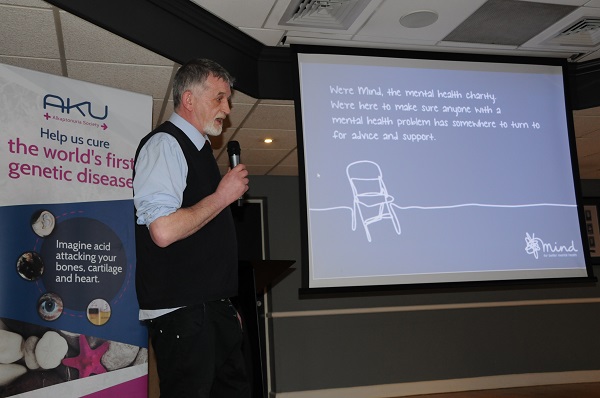This week is mental health awareness week, designed to raise awareness of mental health issues, encourage open discussions and push for improvements to these underfunded services. This week’s blog talks about the importance of managing mental health effectively with an emphasis on mental health in long-term conditions.1 in 4 people in the UK will experience a mental health problem in any one year, however it is estimated only a quarter of these people receive ongoing treatment. These problems are having a profound impact on millions of people, yet service cuts and failure to give mental health the same attention as physical health mean the majority are still struggling alone.

The theme of this
year’s awareness campaign is relationships, with the need for a greater focus on the quality of our relationships that are fundamental to our health and well-being. Here at the AKU Society, we understand the importance of uniting our patients, building long-lasting connections and reducing the sense of isolation commonly associated with living with a rare disease. By connecting with other patients both
online and through our patient workshops, we strive to build a strong AKU community, where patients can support and learn from one another.To support our patients manage the challenges associated with living with a long-term condition, James Moore from
Mind ran a session on mental health at our recent
International Patient Workshop. James opened the session with some deeply concerning statistics highlighting the extremity of mental health problems in the UK, with over 100 deaths as a result of suicide each week.

Many of us will experience mental health difficulties throughout our lifetime, so it’s important to recognise what triggers a crisis and put appropiate coping strategies in place. James was keen to stress that wellbeing can’t be given to you, but it’s you that has to take action and puts steps in place. By recognising your own ability and using appropriate strategies, coping with normal stress becomes manageable, work is more productive and opportunities to contribute to the community become more fulfilling.There are many techniques that contribute to good mental wellbeing, it’s all about finding the ones which work best for you. Some of the techniques put forward by James include connecting with those around you, keeping active, learning and
mindfulness.Mental health awareness week does an important job in raising awareness, encouraging open discussions and reducing the stigma around mental health. This is a very important topic for our patients and for the millions struggling with mental health. We will continue to work with our patients to support them, seek funding for activities to boost mental health and push for critical service improvements.If you or someone you know is experiencing mental health problems, you don’t have to suffer alone. Mental health charity,
Mind are on hand to offer advice and support, just call 0300 123 33 93.He went on to discuss the link between physical and mental health. Many of our patients have to contend with high levels of pain and reduced mobility and managing these physical symptoms can unsurprisingly impact mental well-being.
Pete Moore’s pain toolkit offers useful tips and advice for managing pain, with focus on accepting limitations, making adjustments and setting goals and targets.Good mental wellbeing is important for our physical health, helping us to achieve our goals. Common symptoms of
depression include a lack of interest in usual activities, tiredness and persistent loss of energy. Experiencing such symptoms impacts on daily life, making it difficult to adjust to challenges and get motivated to set goals. As a result, physical symptoms become much more difficult to manage.
